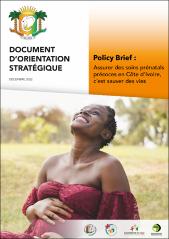Browsing Policy Brief by Title
Now showing items 1-20 of 91
-
A Call to Action: Support Countries Need to Mitigate the Long-term Impacts of COVID-19 on Education in Africa.
(GPEKIXADEARelief WebUNESCO, 2023)The KIX Observatory on COVID-19 Responses in Africa's Educational Systems collected perspectives of education stakeholders on the potential long-term impacts of COVID-19 on educational systems in seven sub-Saharan Africa ... -
A Human Rights- Based Approach to Food Security in Kenya And South Africa
(APHRCResearch Gate, 2023)This policy brief highlights the state obligations vis a vis enjoyment of the right to food in kenya and South Africa . -
A Review on Progress in Improving Maternal, Child and Adolescent Health in Uganda
(Countdown to 2030, 2023)This evidence briefs report presents findings on the review of Uganda's progress in improving maternal, child and adolescents health.The findings are part of the endline review for Uganda's RMNCAH investment case. -
Abortion Incidence and Severity of Complications in Liberia
(APHRC, 2023)This fact sheet summarizes findings from a 2021 nationwide abortion study in Liberia, conducted between September 2021 and March 2022 by the Ministry of Health, the Clinton Health Access Initiative Liberia, the African ... -
Advancing Gender-Transformative Parenting to Improve Early Childhood Development Outcomes in Kakamega County
(APHRC, 2025)Teenage parenthood continues to pose serious developmental and socioeconomic challenges in Kenya. According to the Kenya Demographic and Health Survey (KDHS) 2022, 15% of adolescent girls aged 15 -19 have begun childbearing. ... -
Agir Sur Le Taux D’achèvement En Consultation Prénatale (CPN) Pour Contribuer À La Réduction De La Mortalité Maternelle Au Sénégal
(Countdown to 2030, 2023)This publication provides insights of the Act on the completion rate in Prenatal Consultation (ANC) to contribute to the reduction of maternal mortality in Senegal -
Amélioration De La Qualité des Données SRMNIA-N De Routine Pour Une Planification Basée Sur Les Évidences Au Sénégal
(Countdown to 2030, 2023)This Policy brief provides insights on improving the quality of routine RMNCAH-N data for evidence-based planning in Senegal. -
An in-depth insight into the household and healthcare financing in rural and peri-urban households in Kakamega and Kisumu
(2021)About 100 million of the world’s population is driven into extreme poverty due to ill health and lack of access to quality healthcare. Governments prioritize to ensure that the population accesses essential health services ... -
Assessment of Demand Versus Supply of Cancer Services in Kenya
(Countdown to 20230MoH Kenya, 2023)Kenya, like other developing countries, is undergoing an epidemiological transition marked by a decline in morbidity and mortality due to communicable conditions, and an increase in the burden of non communicable diseases ... -
Assurer Des Soins Prenatals Precoces En Cote d'Ivoire, C'est Sauver Des Vies
(Countdown to 2030, 2022)This policy brief highlights the results of the analyzes relating to CPN1 in the first trimester of pregnancy and on the facilitators and barriers to the use of RMNCAH+N services. It is intended for public authorities, ... -
Assurer Des Soins Prénatals Précoces En Côte d’Ivoire, C’est Sauver Des Vies
(Countdown to 2030, 2023)This policy brief provides insights on how providing early antenatal care in Cote devoir saves lives -
Banking on Artificial Intelligence and Emerging-Technologies
(The StandardIDRC, 2023)The African continent is experiencing a remarkable transformation in various sectors, with healthcare being a critical area of focus. The COVID-19 pandemic was a watershed moment, compelling governments across the world ... -
Basic maternal and child health continuum of care in regional Kenya.
(2021)This policy brief highlights descriptive findings of the maternal and child health (MCH) continuum of health care in rural/semi-rural western Kenya. The African Population and Health Research Center (APHRC) and Amsterdam ... -
Care Economy: Pathway for Human Flourishing, Poverty Reduction, and Economic Growth
(Global Solutions Initiative, 2025)This paper highlights how inclusive care economies particularly through expanded access to affordable, quality childcare can unlock multidimensional benefits: pathways out of poverty, human capital development, enhanced ... -
Characteristics of Positive Research Cultures in Africa
(APHRC, 2023)Scholars, governments, and funders are increasingly interested in promoting positive and inclusive research cultures. Research culture influences researchers' career paths and determines the way that research is conducted ... -
Community Profiling in Korogocho And Viwandani, Nairobi
(Arise ConsortiumResearch Gate, 2023)The Accountability and Responsiveness in Informal Settlements for Equity(ARISE) project seeks to understand the role of accountability in improving health and wellbeing inequities of marginalised and vulnerable groups ... -
Comprendre Les Experiences Des Adolescentes Enceintes Et Meres Dans La Region Du Centre Au Burkina Faso: Resultats D'une Etude Mixte
(APHRC, 2022)This brief presents findings from a mixed study on experiences of pregnant adolescents and mothers in the Central region of Burkina Faso. -
Consultative Workshop on Research Data Access and Use for Public Health Decision-Making: Briefing June 2023
(APHRC and KEMRI, 2023-06)There is a lack of clarity on the extent to which surveillance data generated by researchers/ academia are accessible to policy/ decision makers. This is particularly true at the sub-national level. Even when accessible, ... -
COVID-19 and Human Rights: Perspectives and lived experiences of the Urban Poor in Kenya with regards to government COVID-19 response measures.
(2021)The COVID-19 outbreak, declared a pandemic by the World Health Organization (WHO) in March 2020, was first reported in China and has since spread across the globe. This sent the world into a state of panic. After the ... -
COVID19 and Community Healthcare Mobile health consulting as an option for improved access to healthcare in Nairobi's slums
(2021)Mobile phone communication technology has increasingly been suggested as an option for the delivery of healthcare services globally (1–3). In Kenya, this technology provides numerous opportunities for the improved provision ...
















